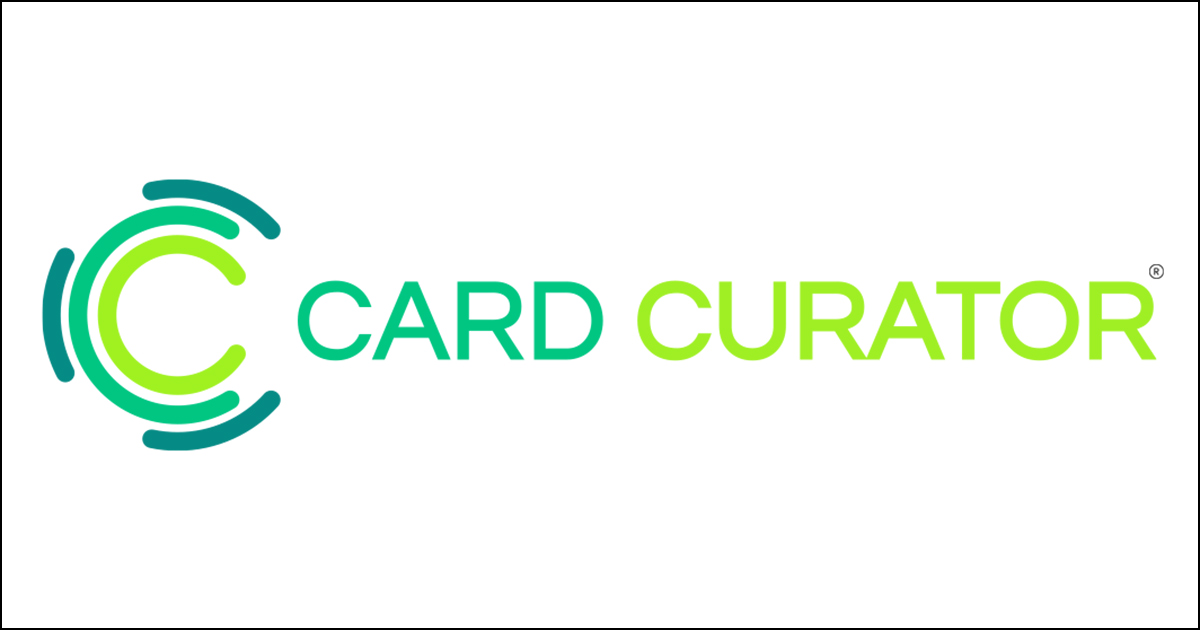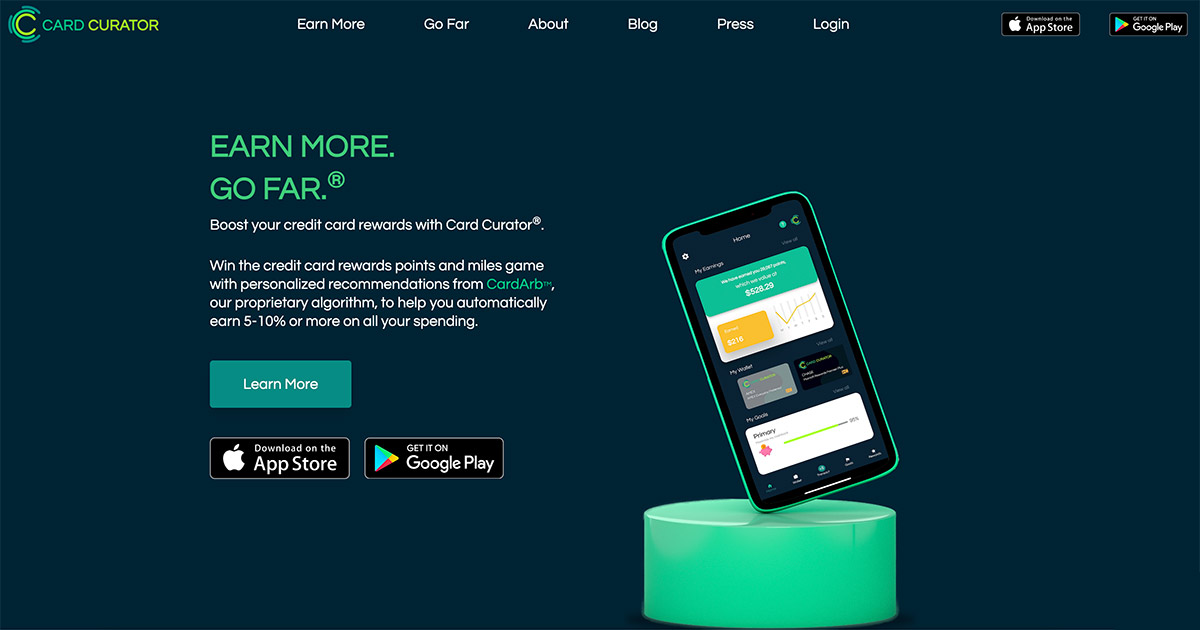Odynn Profile (Formerly Card Curator)

Last Updated: By TRUiC Team
Card Curator is a fintech startup that helps credit cardholders yield the greatest rewards on their daily purchases without spending more by offering independent and objective advice.
Interview With John Taylor Garner
Describe your product or service:
“Card Curator is a credit card rewards optimization app that helps cardholders earn more rewards on their spending through personalized and impartial credit card recommendations. There are two versions of the app, a free and premium version. Card Curator Free is a simple credit card recommendation tool that requires no sign-up with the app to use. Free users will manually select from the app’s card database the current credit cards in their wallet (sensitive and personally identifiable information such as the cards’ numbers is not asked for), and the tool will then recommend based on their geolocation which of their credit cards that yield the greatest rewards on every purchase. This version will also recommend to users the best possible card to apply for that can earn them optimal rewards according to the spending category.
On the other hand, Card Curator Premium uses a proprietary algorithm that can net cardholders 5%-10% in rewards on their daily card spending. What makes Premium so unique is that its users can set a rewards goal (whether it be for travel, charitable giving, return, or cash back), link up their current credit cards into the app, and the algorithm then tells them which credit cards to apply for in a specific order; as well as which credit cards in their wallet to downgrade or cancel. Furthermore, the algorithm will take into account the current points a user has, along with the transfers or combinations needed to meet their set goal. Premium users can also track their rewards goal as well as the progress of their sign-up bonuses.
Like the free version, Premium will recommend which credit cards in a user’s wallet to use for every purchase based on their geolocation as well. So, if a user needs to meet the minimum spend for a sign-up bonus, the app will then recommend to them that card with the sign-up bonus offer to use on a specific purchase, ensuring that they meet the minimum spend within the designated time frame.
Most importantly, Card Curator doesn’t store any personal or sensitive information such as credit card numbers or bank account information. Lastly, all credit card recommendations are unbiased as Card Curator doesn’t partner with any credit card issuers or banks and doesn’t receive payment for referrals, applications, and activations of credit cards.
There are two pricing tiers for Premium; users can choose to pay either $5.99 per month or $60 a year. Card Curator is also currently offering a free 90-day trial of its premium version to new users.”
Describe your company values and mission:
“Card Curator was created to help consumers put the power back into their wallets. We chose not to partner with banks and credit card companies because we want to give our users the opportunity to choose the best credit cards that suit their lifestyle without any influence from our side. There are plenty of companies out there who receive compensation for their credit card recommendations, and we feel that is unjust as they may be promoting a product, not due to its benefits, but because they’re receiving some sort of kickback for activations and/or referrals. We feel that by offering impartial and personalized credit card recommendations, we’re giving our users a chance to decide for themselves whether or not the new credit cards we suggested align with their goals of the rewards they’re looking to earn and with their spending as well.”
How are you funded? I.e. type of funding, number of funding rounds, total funding amount.
“When starting Card Curator in 2018, the funding was completely boot-strapped prior to the pre-seed round. During that time, Bruce and I funded the app’s development and the business’ operational costs and spent a total of $200,000 out of our own pockets. For the pre-seed round, which closed in December of 2020, Card Curator was able to raise $475,000. The pre-seed round consisted of angel investors, family members, and friends. In January of 2022, we raised a second round of funding of over $500,000. We have been using this funding to improve our product based on users’ feedback, along with creating new cutting-edge technologies that were on our roadmap and were also requests from some of our B2B partners (stay tuned for official announcements).
We’re currently gearing up for our seed round raise for this summer and are looking to raise $3 million.”
How big is your team? Tell us a little about them (I.e. co-founders, freelancers, etc.)
“Card Curator’s co-founders are me, Bruce Garner, and Anuj Patel. Prior to Card Curator, I worked as a volatility trader for Merrill Lynch for five and a half years, and I hold an MBA from the Wharton School of the University of Pennsylvania. Bruce worked at numerous prominent financial institutions such as J.P. Morgan, Deutsche Bank, and Royal Bank of Canada; he has over thirty years of experience in the global commodity sector and holds an MBA from the Samuel Curtis Johnson Graduate School of Management at Cornell University. As for Anuj, he worked as a certified public accountant in the finance industry for over five years, where he handled mergers and acquisitions at multiple asset management firms for clients in the commercial real estate and hospitality industries. He holds a master’s in Computer and Information Technology from the University of Pennsylvania.”
How did you come up with and validate your startup idea? Tell us the story!
“I came up with the idea for the app after taking a luxurious trip to Japan and Korea with my friends back in 2017, and the trip was 100% funded by credit card rewards. It was my most ambitious credit card-funded free travel yet. I began planning the trip ten months in advance and during that time, advised each friend to open four to five new credit cards. As a result, my strategy paid off, as all of our flights were first class and all of the hotels were five-star, all of which were paid for through credit card sign-up bonuses and accumulated points and miles.
After the trip, I realized how time-consuming and complicated it was to plan a group trip like that, and how beneficial it would have been to have a tool that would unbiasedly recommend to me which credit cards to sign up for (instead of spending hours researching the best offers that fit my needs and lifestyle), and that would also allow me to track all of my rewards in one place. That’s when the idea of Card Curator came into my mind.
I then went to Bruce, who is one of the co-founders and the executive chairman of the company, with the idea of Card Curator. Bruce saw the great potential of the app and the need to develop it, so he decided to join my pursuit of building out the app. Shortly after, I left my job at Merrill Lynch to begin working on the app full-time.
A few years later, Anuj joined the Card Curator team as a co-founder and the director of engineering after meeting me at a networking event at the University of Pennsylvania, in which both of us were attending the university’s master’s programs full-time. At the event, I told Anuj about the Card Curator app and its functionalities, which ended up being similar to the app that he was planning on developing. So, Anuj jumped at the opportunity to join the company and lead its software development efforts.”
How did you come up with your startup's name? Did you have other names you considered?
“We first started out with the name ‘Credit Card Curator’ but ultimately decided to drop ‘Credit’ from our name as it made the name too long. Not to mention, we chose to stick with the name ‘Card Curator’ because we felt that it got the point across of what our app does, as we curate your credit cards, points, miles, and spending. Furthermore, we also liked the abbreviation of Card Curator (CC) because it’s the same abbreviation for ‘credit card.’”
Feeling inspired? Learn how to launch your company with our guide on how to start a startup.
Did you encounter any roadblocks when launching your startup? If so, what were they and what did you do to solve them?
“Our greatest challenge thus far was when we launched the app to the public. We were planning on launching on the [Apple] App Store and on Google Play in 2020, but the pandemic put a halt to our launch plans. The value proposition of our app is earning cardholders free travel by helping them maximize their rewards. So, with travel restrictions in place, we decided to hold off on launching publicly. However, in early 2021, when the vaccine rollouts began, optimism surrounding travel returned. Therefore, we decided to launch our app on the Apple and Android stores in March of that year. Overall, our new launch strategy worked as we had top-tier outlets such as Bloomberg cover and recommend Card Curator as one of the best new apps to help credit cardholders optimize their rewards for travel.”
Who is your target market? How did you establish the right market for your startup?
“Our app’s premium version’s target market is credit cardholders who earn a salary of around $100,000 a year and put a large portion of their purchases on credit cards. They are also looking for guidance on ways to earn more rewards on their daily card spending in order to meet the rewards goal they have in mind, and want to be shown how to redeem their points for maximum value — all of which our app’s algorithm does. Moreover, they are people who take frequent trips either by themselves throughout the year or an annual trip with their family and want to use their rewards for those trips.
As for the free version, its target market are those who are starting off in the credit card rewards game or who are simply looking for recommendations on how to earn more rewards on all of their purchases with the credit cards in their wallet. With Free, we are targeting younger people who are beginning their careers, and who are also earning around $60,000 per year as an annual salary.”
What's your marketing strategy?
“Google Ads has been working very well for us so far. We launched our ads campaign on Google in July of 2021 and saw our user base grow by 700% over the span of five months. With Google Ads, we have been able to sustain user growth of approximately 150% month-over-month.
Furthermore, we chose to stick with Google Ads because we found that not only was it cost-effective, but we saw more results as opposed to ads on social media platforms such as Instagram, Facebook, Twitter, etc. Ad campaigns on social media platforms can be very costly, especially when competing with other apps in the consumer financial space since that industry is a very crowded space.
Overall, the most cost-effective marketing strategy for us was our guerilla giveaway campaigns. We ran one in August of 2021 for a free trip to Cabo San Lucas and another in December of that same year for Puerto Rico. In the end, both campaigns increased not only our follower counts on our social channels but also added over 1,000 monthly active app users. The costs for the giveaway campaigns were lower than any direct advertising that we have done.
Lastly, what also works for us is organic blog content. I frequently contribute my expertise on the travel and credit card points and miles space for Card Curator’s blog. As a result of posting my expert blog articles, Card Curator’s Twitter account grew from 100 followers to over 400, and its LinkedIn account went from just under 700 followers to 1,141 followers in the span of six months.”
How did you acquire your first 100 customers?
“We acquired our first 100 users from our public launch on Product Hunt in March of 2021, the same day we launched our public beta on the App Store and Google Play store. On Product Hunt, we ended up being the number one fintech app that day and also had the second most comments of any application that launched on the platform.”
What are the key customer metrics / unit economics / KPIs you pay attention to to monitor the health of your business?
“We look at all the standard metrics, daily active users, weekly active users, monthly active users, number of installs, number of repeat users, number of uninstalls, number of bank accounts connected, number of credit cards added, number of goals added, number of goals completed, etc.
As for unit economics, we look at the conversion rates from our various ads, including install, full user, and paid user. We also look at our partnership arrangements and those conversion rates.”
What's your favorite startup book and podcast?
“My favorite entrepreneurial books are ‘Grit: The Power of Passion and Perseverance’ by Angela Duckworth and ‘Range: Why Generalists Triumph in a Specialized World’ by David Epstein. My favorite podcast is the ‘Wharton FinTech’ podcast.
Bruce’s favorite books are ‘Steve Jobs’ by Walter Isaacson, ‘The Wright Brothers’ by David McCullough, and ‘The Prize: The Epic Quest for Oil, Money, and Power’ by Daniel Yergin.
As for Anuj, his favorite entrepreneurial book is ‘Principles’ by Ray Dalio, and his favorite podcast is NPR’s ‘How I Built This.’”
Is there a tool, app, or resource that you swear by to help run your startup?
“We use Segment as our analytic hooks for user conversions and follow-throughs. We also use Amplitude to measure user acquisition and engagement within our app. As for marketing, we use HubSpot to measure our web traffic, publish and analyze our blog posts, and send out our newsletters.”
What is something that surprised you about entrepreneurship?
“Just how cyclical everything is. When things are going well, they are going really well, then you hit a speed bump, and you're in a rough patch. These periods can last for hours or days or weeks; it’s never consistent and always happens. However, it’s the nature of the business. Also, you’re always growing and learning something new every day.”
How do you achieve work/life balance as a founder?
“I like to set some time aside for myself per day to decompress, whether it be working out, reading a book, or spending time with my family or friends. It’s no secret that entrepreneurs easily burn out as building out a company and product requires a lot of effort and energy. Therefore, by carving out some time for yourself a day, it gives you the opportunity to not only unwind but to also re-energize, which can help you become more productive and contribute to your overall well-being.”
Did you have to develop any habits that helped lead you to success? If so, what are they?
“Yes, not being afraid to make mistakes. The key thing is we learn from them but also make sure they are calculated. Taking unnecessary or too large risks could put an early startup out of business.”
What was your first job and what did it teach you?
“Before Card Curator, I was a volatility trader at Merrill Lynch, where I ran the international macro cross-asset volatility book. During my time there, I learned how to take calculated and strategic risks. I now use those skills to help run our startup. Contrary to popular belief, being an entrepreneur is not about taking risks. It’s about taking carefully planned and targeted risks at the right time.”
Recommended:
- Keep up with more startup companies by visiting our list of the top startups to watch.
- Hear startup stories from real founders on the Startup Savants podcast.
- Form your own startup by reading our review of the best online incorporation services.
Tell Us Your Startup Story
Are you a startup founder and want to share your entrepreneurial journey with our readers? Click below to contact us today!
More on Card Curator

Founder of Fintech Startup Card Curator Shares Their Top Insights
John Garner, founder of fintech startup Card Curator, shared valuable insights during our interview that will inspire and motivate aspiring entrepreneurs.

Here’s How You Can Support Fintech Startup Card Curator
We asked John Garner, founder of Card Curator, to share the most impactful ways to support their startup, and this is what they had to say.


